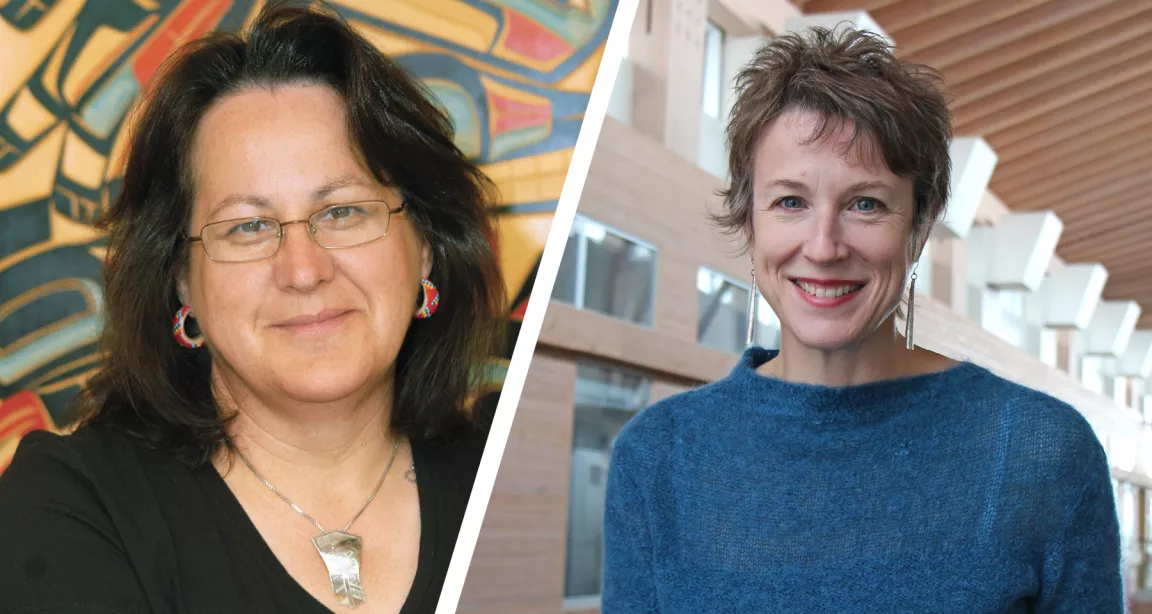UNBC researchers leading $1.3 million project to enhance Indigenous health

Two UNBC researchers, together with northern and provincial partners, have embarked on a five-year research project focused on further enhancing Indigenous health in northern B.C.
Dr. Sarah de Leeuw and Dr. Margo Greenwood received $1.3 million as part of a Healthy and Productive Work Initiative - Partnership Grant from the Social Sciences and Humanities Research Council (SSHRC) and the Canadian Institutes of Health Research (CIHR).
It is the first joint federal research partnership grant of its kind to be held at UNBC, and is one of only nine such grants held across Canada. The work builds on a pilot project launched in 2016.
Key partners on the five-year project include numerous Indigenous and non-Indigenous stakeholders across the North, Northern Health, Two Rivers Gallery in Prince George, and the National Collaborating Centre for Aboriginal Health (NCCAH). The Michael Smith Foundation for Health Research (MSFHR), also a major partner, is contributing an additional $130,000 in funding.
“We are excited to have started this journey with our partners through which we will explore ways to celebrate Indigeneity in health care,” said de Leeuw, Northern Medical Program and Geography Associate Professor. “It’s an opportunity to develop northern-focused solutions that seek to create a more culturally humble health-care system that embraces Indigenous people and Indigenous knowledge.
Over the course of five years, the project will focus on ways to transform health service delivery in northern B.C., across existing organizations and professions, into a culturally safe and culturally humble environment in which to provide and receive care. It also aims to inspire new generations of Indigenous youth in the North to enter the health-care field.
“We are going to look at what each of us in the North can do to help support our common goals in this project,” noted Greenwood, First Nations Studies and Education Professor, and Northern Health Vice President of Indigenous Health. “This means getting together with stakeholders across the region, having good conversations around the issues, and encouraging people to be self-reflective on practice, programs and the system.
“We know that not one community, employer, post-secondary institution or organization is going to fulfill these goals on their own. It’s going to take a partnered effort to fully address health care needs across the North in a culturally respectful and safe way.”
“Our project aspirations include teaching future health-care providers through experiential learning, training health researchers who will be writing policy and developing the knowledge landscape that health services will be provided within, and inspiring future Indigenous health care leaders,” added de Leeuw.
The SSHRC and CIHR’s Healthy and Productive Work Initiative – Partnership Grant program aims to bring together a wide range of researchers and stakeholders across sectors to help develop and put solutions in place that improve the health and productivity of Canada’s diverse workforce.
“Supporting projects like the one Drs. de Leeuw and Greenwood are undertaking is one of the ways we deliver on our partnership funding priorities to enable Indigenous health and well-being and create better health in northern, rural and Indigenous communities,” said Dr. Bev Holmes, President and CEO of MSFHR. “Their work to enhance Indigenous employment and cultural safety for health care has the potential to make a tangible difference in the health of Indigenous people in the North.”
The project is also receiving support through in-kind contributions, valued at approximately $460,000, from the project’s other major partners, including Northern Health, Two Rivers Gallery, NCCAH and UNBC.
“Access to culturally safe care is a critical part of our ongoing commitment to improving services in our region and fostering respectful and collaborative relationships with our Indigenous communities,” said David Williams, Northern Health Vice President of Human Resources. “We are committed to becoming more reflective of the people we serve in the North and look forward to furthering that goal through this project. We hope to attract more Indigenous employees to our workforce and also continue to improve the workplace for those employees.”
“We are committed to engagement of diverse communities through arts-based initiatives and believe that self-expression, creativity and cultural identity is essential to health and well-being, especially for Indigenous communities,” said Carolyn Holmes, Executive Director, Two Rivers Gallery. “We look forward to collaborating with the other partner organizations coming together to increase culturally agile healthcare employment environments and services in northern B.C., and we strongly believe that one way to do this is through engagement in the creative arts.”
Other project participants include collaborators from the Northern Medical Program, UBC, and McMaster University. The First Nations Health Authority was a key partner in the 2016 pilot project.
“Enhancing cultural safety is an important priority for our Northern region,” said Dr. Daniel Weeks, UNBC President. “The solutions and resources developed through this project in collaboration with Indigenous communities as well as other health-care stakeholders in the North will not only improve our regional health-care environment but also those in other jurisdictions across Canada and beyond.”
This project is supported by the Research Support Fund, a tri-agency initiative of the SSHRC, CIHR and the Natural Sciences and Engineering Research Council (NSERC), which assists Canadian post-secondary institutions and their affiliated research hospitals and institutes with the expenses associated with managing the research funded by these three federal research granting agencies.